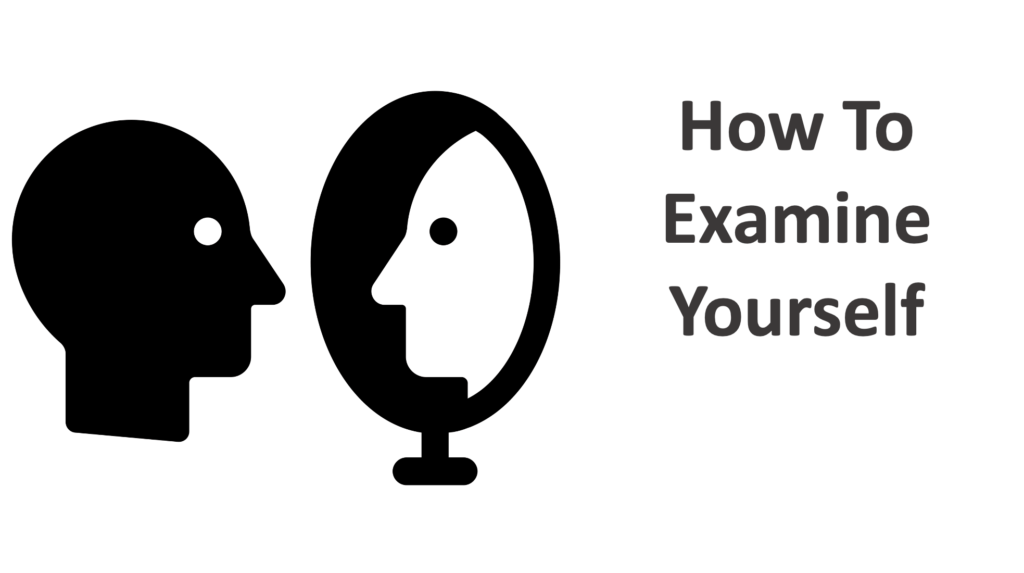Download:
Text:
How To Examine Yourself
Self-examination is a crucial piece to living in a way that pleases God, correcting sin, and growing more mature in Christ (2 Corinthians 13:5). Everything about your life must be subject to these self-examinations – your heart, words, decisions, actions, relationships, religious practices, beliefs, etc. However, this process can be a challenging one in the sense of being able to see all these things as they truly are. Therefore, let’s consider some principles to become better equipped for self-examination.
1) Be honest. People often find what they are looking for. This can be true whenever people examine themselves. For example, it is easy to have a preconceived conclusion about your faithfulness to God and close your mind to the possibility of being wrong. Yet, the Scriptures warn about the real possibility of self-deception (James 1:22, 26). In fact, Jesus says there will be many who will think they followed Him who will be eternally condemned to Hell because of the sin still present in their lives (Matthew 7:21-23). Part of self-deception can be linked to protecting/defending yourself. That is, you can make it difficult to see those things you do not want to see about yourself (i.e. things you do not want to change, do not want to hear, etc.; 2 Timothy 4:3-4). Since people can be blind to themselves if they are not careful, you must develop the deep longing within your heart that seeks God completely (Psalm 119:10-11, 33-40). Whenever you look at your life, then, you must have a heart that is brutally honest and noble in only seeking what is true, regardless of what that means for your life (Luke 8:15)!
2) Use the right standard. God’s word is the only standard that matters in your self-evaluations and determining whether you are in the faith or not. In this matter, the world will pressure you to use many other standards to evaluate your life. For example, some use the standard of your own conscience, yet your conscience can be displeasing to God and mislead you (Acts 26:9-11). Some use the standard of popular opinion, yet the way of the majority is often wrong (Matthew 7:13-14). Some use the standard of human tradition, yet there are traditions that violate God’s word (Mark 7:8-13). Some use the standard of human teachers, yet many teachers teach false messages (Romans 16:17-18). Some use the standard of comparisons with others, yet God warns that this is not wise (2 Corinthians 10:12). You see, the only way a person can truly know what is pleasing to God is through the teachings of the Scriptures (2 Timothy 3:16-17; Psalm 19:7-11)!
3) Examine your fruit. One of the challenging aspects of examining yourself is overcoming the knowledge of your intentions. For example, you can know the importance of serving God faithfully and know that is your desire; but then be blinded to the reality of your failures because you have intended to do the right things. In fact, God plainly teaches that merely intending to do what is good is not sufficient for actually pleasing Him and being saved (Luke 9:57-62). So, one of the principles Jesus teaches on various occasions is to examine the fruit that is produced (Matthew 7:15-20; 12:33-35; James 3:13-18). When you objectively look at the fruit that your life produces and honestly compare that to the standard of God’s word, it will help you see your life as God sees it. In addition, examining your fruit in this way also works to show you the realities of your heart (i.e. your priorities, commitments, affections) that you would not see if you let your intentions blind your evaluations (Matthew 6:19-21)!
4) Seek godly counsel. We can often be blind and self-deceived without realizing it, despite efforts to the contrary. Therefore, those who truly want to examine themselves to make sure they are in the faith will want to invite people into their lives who can help open their eyes to the realities of their spiritual conditions before God. However, once again, you must guard against the temptation to choose people who are not truly seeking God’s will themselves or who will just tell you what you want to hear (Matthew 15:13-14; 2 Timothy 4:3-4)! In fact, God warns about the great danger flattery presents (Proverbs 26:28; 29:5). Rather, the one who loves you enough to tell you the difficult truth is the one you must seek (Proverbs 27:6; 28:23). Therefore, you need to intentionally work to have people in your life who will help you see the truth – even the truth you do not want to admit to yourself (Proverbs 27:17; Galatians 6:1; like the prophet Nathan with King David in 2 Samuel 12:1-14)!
5) Apply your findings. As you diligently examine yourself in the ways we have been considering, you must do something with your findings – or your examination will be meaningless! Namely, you must do whatever God’s word requires of you to correct the wrongs you have discovered and then live obediently in His sight (James 1:19-25)! Don’t let anything get in your way of properly hearing and obeying God’s word. For, only those who hear and then obey God’s words will build well-built lives that please God (Luke 6:46-49)!
How diligent are you in examining your life to see whether you are pleasing God or not? Not only must you first commit to the process of self-examination, but you must also commit to examining yourself in such a way that will actually help you see the truth and take the proper steps to correct what is lacking. Therefore, you must test and examine yourself to see whether you are in the faith or not (2 Corinthians 13:5)!


